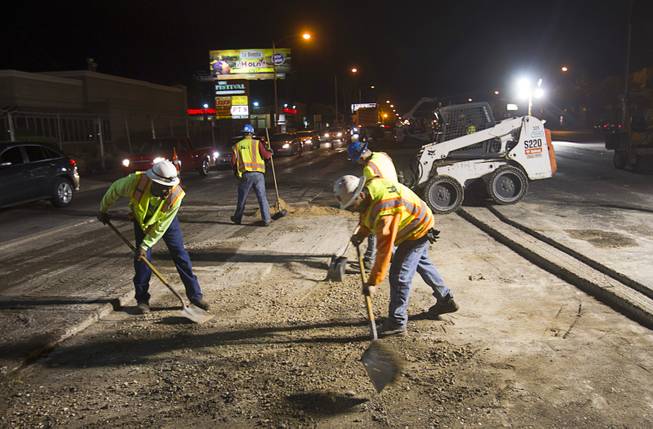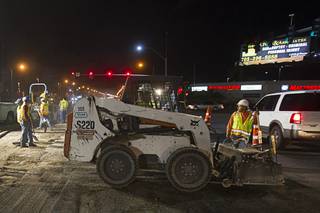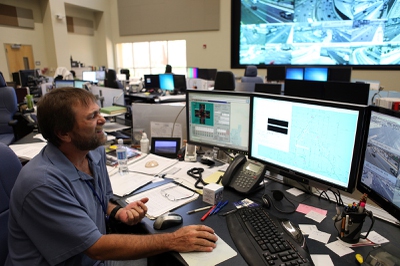
Harber Company employees work on a repaving project on Decatur Blvd. near Flamingo Road Thursday, Aug. 22, 2013.
Sunday, Aug. 25, 2013 | 2 a.m.
Orange cones and construction zones are a constant companion for the tens of thousands of drivers who hit the valley’s roads each day. But with funding for roadwork dwindling, local officials warn there could be a significant drop in construction in coming years.
And while fewer traffic cones might make for an easier commute, dwindling funds also could pose a serious roadblock to the region’s future growth.
That’s why the Regional Transportation Commission and other transportation infrastructure advocates are putting their support behind a proposal to increase fuel taxes in Clark County over the next three years. The Clark County Commission is scheduled to vote on the plan, which already has the approval of the Nevada Legislature, at its Sept. 3 meeting.
At current funding levels, RTC, which pays for most local road construction, says it will be limited to building about five miles of new road within the valley per year.
With much-needed projects like the Boulder City Bypass and improvements to the 215 Beltway waiting to get off the drawing board, RTC officials are looking to a potential increase in the fuel tax to keep the region’s transportation infrastructure moving forward.
Although the price of gasoline has more than doubled since 1995, the RTC’s share of the fuel tax, its primary means of paying for road construction (it also receives a portion of sales tax receipts) has remained flat at 9 cents per gallon.
Inflation has eroded the purchasing power of that 9-cent levy while more fuel-efficient cars have further curbed revenue growth. Most of the $60 million the levy generates annually is being used to pay off bonds for previous projects, leaving the RTC with $22 million per year for new construction, an 80 percent decrease from the $136 million it spent annually over the last decade.
For more
“If this does not pass, I think we’re going to be stalled for a little while," Tina Quigley, the RTC’s general manager, told Clark County commissioners last month. “It certainly isn’t enough to continue to grow and diversify our economy.”
New revenues from a fuel tax increase would allow the agency to spend up to $700 million on new construction over the next several years. Local officials argue the construction would provide a short-term jolt to the economy in the form of new jobs and a long-term boost to the region’s infrastructure.
“There isn't a better economic driver than investments in infrastructure,” said Tom Skancke, president of the Las Vegas Global Economic Alliance and an expert in transportation policy.
“The foundation of any economy is transportation infrastructure. ... At the end of the day whether it’s local streets or highways, we have to move our economy and that means moving goods and people.”
Despite the potential benefits, the tax hike proposal would mean residents pay more at the pump, an issue that’s at the forefront of discussion for county commissioners.
If the increase is approved, Clark County residents would see the 52.2 cents they currently pay in fuel taxes -- a combination of federal, state and local levies -- increase each of the next three years. According to the RTC, the average driver, who drives 13,500 miles on 539 gallons of fuel per year, would pay $16 extra the first year, topping out at $52 from the third year onward.
This is the second proposed tax increase taken up the Clark County Commission in the past month. The More Cops sales tax, which, like the fuel-tax indexing, was approved by the Legislature during this past session but needed the commission’s OK before being put into effect.
County commissioners balked at the .15-cent increase requested by Sheriff Doug Gillespie to retain and hire new police officers and tabled the proposal indefinitely amid public opposition while they continue to scrutinize the Metro Police budget.
The fuel tax could face an easier road to approval, in part because it will provide tangible results: 5,000 new jobs and miles of new roadways. In contrast, the proposed sales tax hike would not lead to a significant increase in the number of officers patrolling the streets for several years.
A majority of commissioners have indicated tentative support for the fuel tax. If that support holds, the RTC could begin work early next year on some of the 100-plus projects it’s prioritized for completion using the new revenue.
The improvements span from surface street work on Stephanie Street in Henderson, a $20 million project, and on Losee Road in North Las Vegas, a $15 million job, all the way to the $201 million the agency says it would spend for construction on the Boulder City Bypass.
“Our priority list of projects was a balance of two things. One is that it takes care of residential areas that help people get from where they live to where they work,” Quigley said in a recent interview with the Sun. “The other one was to take a look at the region as a whole and let’s invest in those projects that are going to help us grow and diversify our economy.”
Infilling unfinished roads in residential areas and making large-scale improvements to major thoroughfares and highways will attract businesses, she said.
“When (businesses) look at transportation, it’s ‘Are my employees going to be able to get from where they live to where they work? Is my stuff going to be able to get to my business easily? Do I have connectivity to Los Angeles, Salt Lake and Denver?’” Quigley said, adding that ease of transportation, along with education, are among the two biggest factors businesses consider when choosing where to locate.
Because Southern Nevada imports most of its goods, roads and highways serve as the “backbone” of a region’s economy and require continual investment, Skancke said. With construction prices still low in the aftermath of the recession, he said now was an ideal time to invest.
“If we put it off two years, the quality of the pavement that we have does decrease. Congestion at the Spaghetti Bowl is only going to get worse as more people go back to work,” he said. “I think in this economy we're going to get the best prices, you're going to get the best contractors. If we don't make these investments now, it's going to be more expensive in the future. The problems are only going to escalate.”
Continued multibillion-dollar infrastructure investments in cities like Phoenix and Salt Lake City further increase the stakes for the RTC, which is pressured to keep up on a smaller budget.
Although revenue from increasing the fuel tax in Clark County won’t match the scale of investments in other cities, it will buy the region some time while a more comprehensive plan for transportation in the state using a wider variety of funding mechanisms is worked out, Skancke said.
“If we make these investments, it will make Las Vegas even more globally competitive,” he said. “We'll send the message out to the world that we're investing in infrastructure to do better business in Nevada.”



Join the Discussion:
Check this out for a full explanation of our conversion to the LiveFyre commenting system and instructions on how to sign up for an account.
Full comments policy